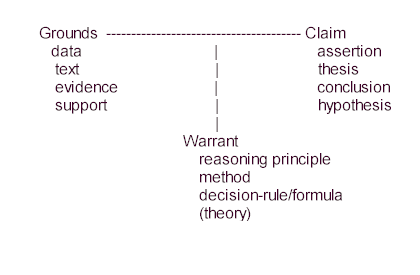The Critical Thinking Process
Lee McGaan
adapted in part from Stephen Toulmin. The Uses of
Argument,
|
1. All scholarly
activity, regardless of discipline, involves the same basic intellectual act,
as shown below. The essence of
critical thinking is recognizing the nature of what is claimed, how it is
supported and “proved,” and the logic used to prove the claim (described in
the warrant).
2. Disciplines vary A. in their preferred / accepted warrants
B. in what counts as grounds/evidence, and
C. in their forms of expression for results.
|
||||||
